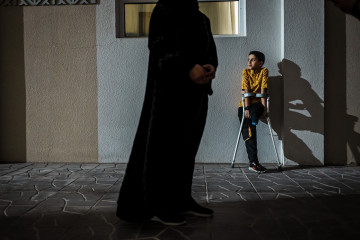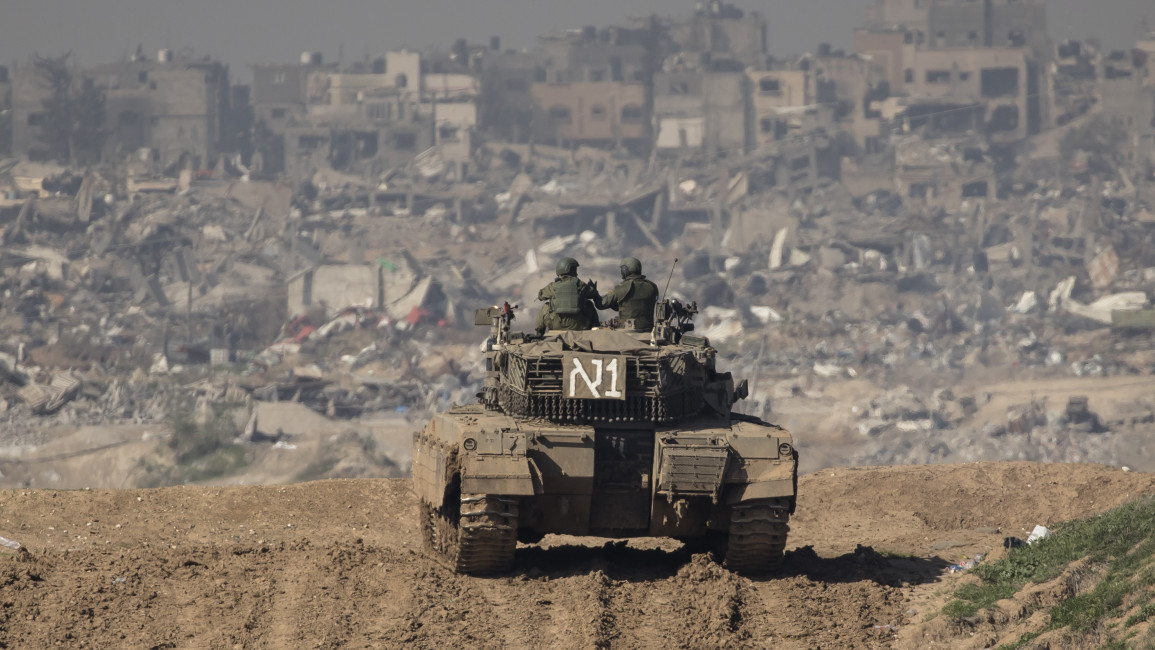

From toddlers and teenagers to adults, Israel’s war on Gaza has resulted in thousands of amputations that have left Palestinian victims with immediate and lifelong needs.
No official statistics are available, but a significant proportion of the 85,000 people the local health ministry says have been injured since the war began are thought to now require prosthetic limbs.
Earlier this year, the NGO Humanity & Inclusion reported that 70 to 80 percent of those being admitted to the 12 hospitals which were still partially functioning in Gaza had lost limbs or suffered spinal cord injuries.
A lack of medical supplies due to Israel’s blockade on aid and its destruction of Gaza’s hospitals has meant doctors have been forced to carry out amputations without anaesthesia, and sometimes with crude instruments.
Furthermore, only 30 percent of Gaza’s pre-war medics are still working due to deaths, detentions, and displacements, according to the World Health Organisation (WHO), placing an added strain on those still carrying on.
A Gaza-based doctor, Rajaa Hassan, told The New Arab that amputations are sometimes the only option available, even if unnecessary, as Israeli forces have impeded access to blood banks meaning transfusions are impossible.
A lack of antiseptic means injuries can quickly become gangrenous, with amputating injured limbs often the only way to cauterise bleeding and save patients’ lives.
Gaza's crisis of child amputees
Israel’s war has particularly impacted children. In addition to the more than 14,000 killed, UNICEF estimated in January that around 1,000 children had lost one or both of their legs, equivalent to 10 children losing a limb every day in Israeli bombardments.
That number is likely to have been “far surpassed” since then, the group said in June.
Earlier this year, London-based doctor Ghassan Abu Sittah said that Gaza was witnessing the “biggest cohort of pediatric amputees in history", with the surgeon performing up to six amputations a day while working in the besieged territory for 43 days.
London-based charity Save the Children says that Palestinian children injured by Israel’s explosive weapons are suffering “unimaginable physical and mental harm”.
The lack of medical care and facilities to help them later on in life only compounds their suffering, with amputees placed at further risk by their inability to flee ongoing Israeli attacks on Gaza.
Due to a lack of resources, Palestinian healthcare workers have resorted to making homemade prosthetics as temporary aids to help amputees who have lost limbs in the war until they can access proper prosthetics.
“Despite the tough conditions, we have not allowed the war to be a barrier that forces us to wait until it ends to help the injured or provide some much-needed services to them, whether they need prosthetics or rehabilitation,” Moataz Abu Dayeh, a physiotherapist in Gaza, told The New Arab.
Moataz and his colleague Abdullah Salmi, a volunteer prosthetics maker, use primitive alternatives such as plastic, wood, and sponges due to a lack of other materials.
Long-term impact on Gaza
Gaza already had a high number of amputees from previous Israeli wars in 2008-9, 2012, 2014, and 2021, but the crisis of amputees since the war began in October has significant long-term consequences on individuals and society.
Palestinian photojournalist Sami Shehada, who lost his leg in Israeli artillery shelling targeting a group of journalists in the Nuseirat refugee camp told The New Arab about his experience.
“While documenting the Israeli occupation's crimes against civilians who had fled their homes due to intense shelling from warplanes and artillery in Nuseirat camp, I arrived with my colleague, reporter Sami Barhoum, alongside many other journalists,” he said.
“Suddenly, a direct artillery shell struck me, resulting in the immediate amputation of my leg and leaving me with numerous fragments still lodged in my body, causing persistent pain,” Barhoum explained.
Now reunited with his family after a prolonged absence due to work and displacement, he navigates life with crutches for support, relying on others for many tasks he once did independently.
|
|
For those affected, the loss of a limb leads to physical and mental challenges, necessitating extensive medical care, rehabilitation, and psychological support.
Many face obstacles in reintegrating into the community, including employment barriers and reduced mobility, affecting their quality of life and independence.
Despite these challenges, many amputees demonstrate remarkable resilience, receiving support from local communities and humanitarian organisations to rebuild their lives amidst the ongoing turmoil and uncertainty.
Sobhi Soboh, a physiotherapist and board member of the Palestine Children’s Relief Funds amputees project, spoke to The New Arab about his experience as an amputee since the age of eight.
He lost his leg after an Israeli bomb caused a wall to collapse on his family home in northern Gaza as he was playing.
"UNICEF estimated in January that around 1,000 children had lost one or both of their legs, with that number thought to have risen considerably since then"
“I spent five years of my life walking on broomsticks and from time to time I just made my own crutches from metal steel that felt very heavy to walk with,” Soboh told TNA.
“After I met PCRF in 2008, my life changed when they helped me with my first prosthetic leg in the US as I was having suicidal thoughts due to the physical and mental toll the situation was having on me.”
Determined not to be defined by his loss, Soboh pursued a new path after he moved to Hungary, where he trained as a physiotherapist.
“Today, I aim to shed light on the mental toll that amputees in Gaza face, pain that often extends far beyond physical injury,” he said.
Gaza’s healthcare system has been under severe strain due to a 17-year Israeli blockade, economic sanctions, and damage to medical facilities during multiple Israeli wars. This has made it difficult to provide timely and adequate medical care to those with serious injuries or prosthetic devices.
Being an amputee in Gaza amid the current war is exceptionally difficult due to the combination of limited medical resources, physical barriers, economic hardships, and psychological trauma exacerbated by the ongoing conflict and humanitarian crisis.
Sara Khoury, a clinical psychologist specialising in trauma and researching psychological adjustment to disability and rehabilitation at Saint Joseph University of Beirut, explained to The New Arab that the loss of a limb is a traumatic event that makes recovery challenging.
Amputees often experience post-traumatic stress disorder (PTSD), with flashbacks, nightmares, and severe anxiety as they relive their injury.
Grief over the lost limb can lead to depression, characterised by persistent sadness, loss of interest in activities, and feelings of hopelessness, according to Dr Khoury.
She also explained that anxiety is common due to uncertainties about future mobility, independence, and the ability to support themselves and their families.
Rodayna Raydan is a Lebanese British journalism graduate from Kingston University in London covering Lebanon
Follow her on X: @Rodayna_462




 Follow the Middle East's top stories in English at The New Arab on Google News
Follow the Middle East's top stories in English at The New Arab on Google News


